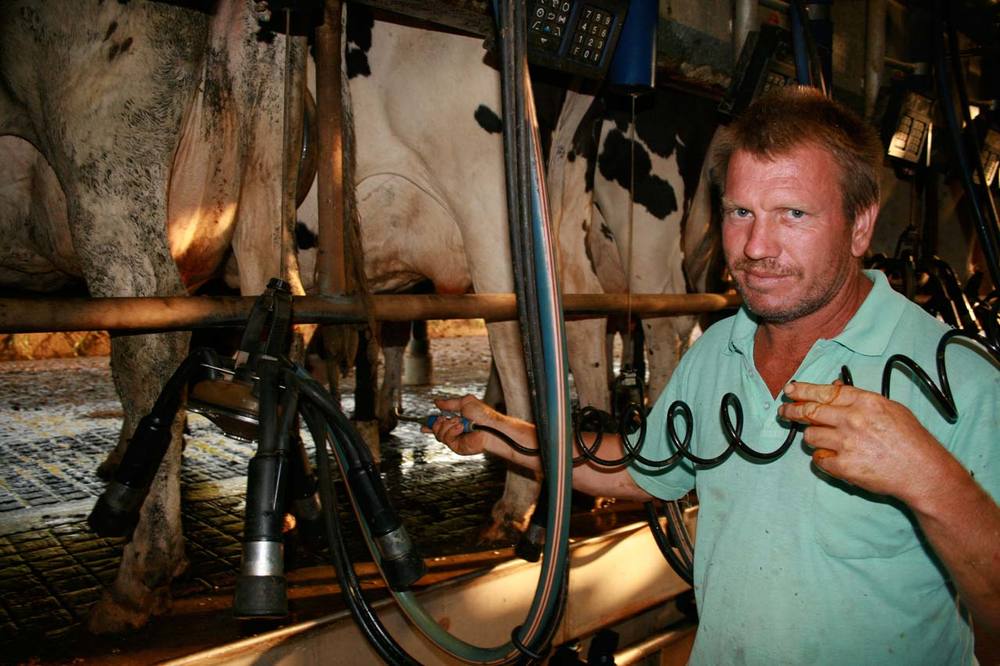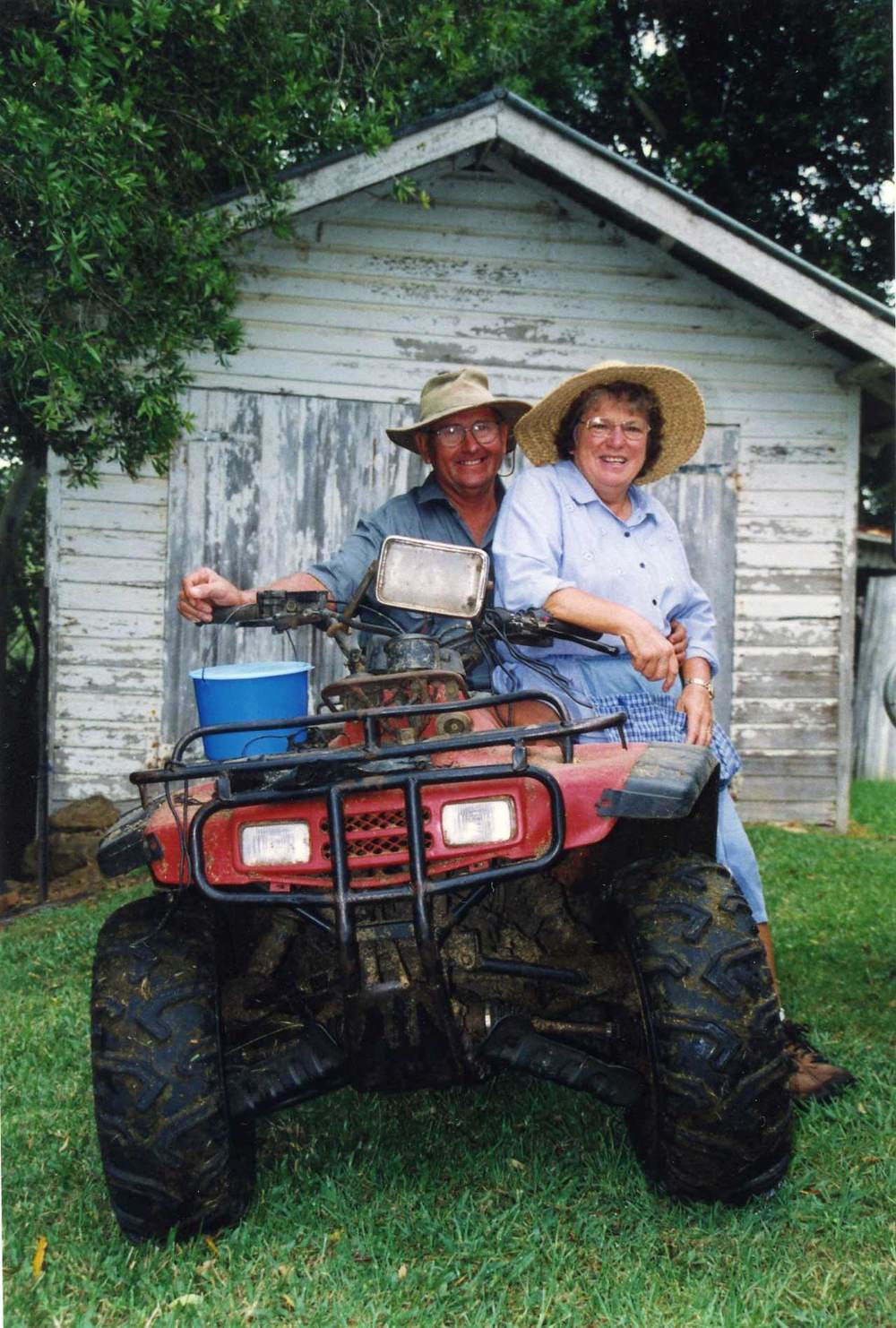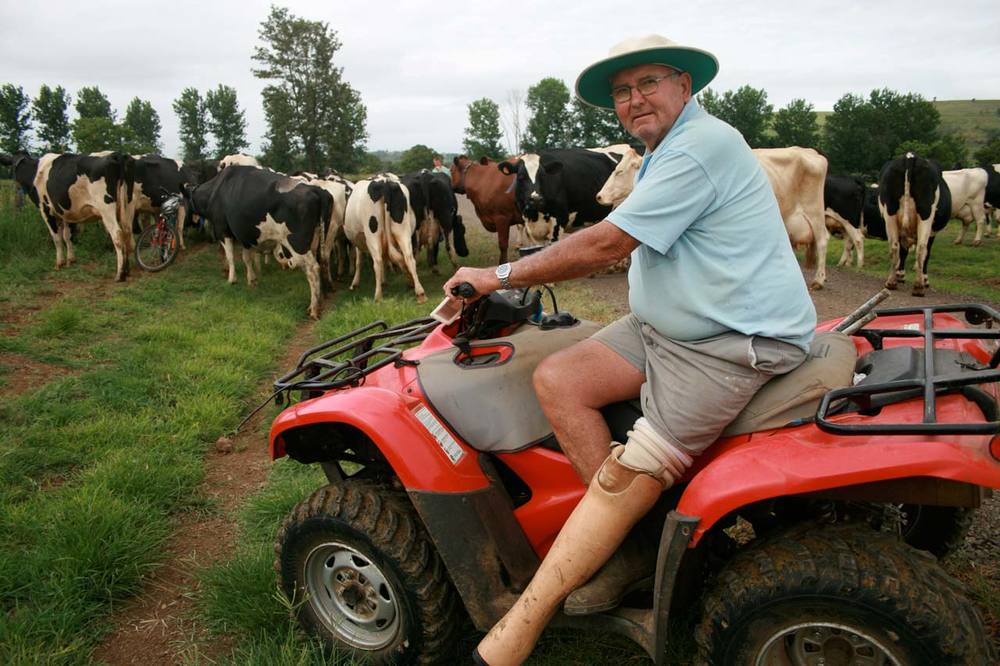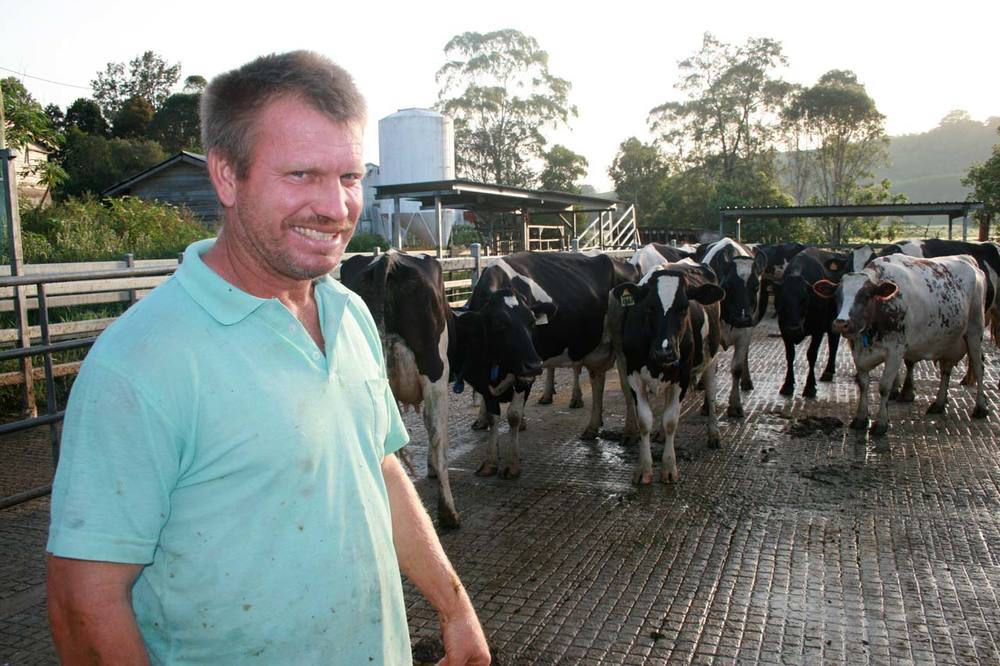SUNDAY PROFILE: Ken Bryant and the Corndale dairy
Liina Flynn
22 August 2020, 7:53 PM
 Kenneh Bryant - dairy farmer works till the cows come home.
Kenneh Bryant - dairy farmer works till the cows come home.Ken Bryant and his family have spent their lives on their Corndale dairy farm. It's been a labour of love that has spanned generations - and they are one of the few dairy farming families left operating dairies in the area. He and his mother Kaye talk about the dairying lifestyle and the changes over time.
It’s 6am in the milking shed at Cosy Camp Farm and 30 cows are happily munching on feed mix. Dairy farmer Kenneth Bryant detaches vacuum pumps from their udders, while another shower of cow dung from above lands near him.
“After milking, we spray their udders with an iodine and oil spray to stop them getting mastitis,” Kenneth said.
The fourth generation dairy farmer from Corndale and his family own one of the 90 remaining dairy farms on the North Coast and he’s quick to say that it was because of the support of his family.
“Around here, all farms are family farms,” he said. “People can’t get into farming unless it’s passed on as a family business. The entry cost is so capital expensive that unless you have parents who will help you into it and provide vendor finance, there’s no way in.
“Dairying is something that really lends itself to families because it means working seven days a week.
“Unless you have grown up with it, it seems absurd to get up at 4am.”

Ken in the dairy.
Lifestyle
For over 100 years, the Bryant family has been dairying on the North Coast. Kenneth’s parents Selwin and Kaye Bryant took over running the farm from Selwin’s mother in 1965.
Selwin passed away a few years ago, but he and Kaye loved the farming lifestyle. Selwin grew up on a farm and wanted his kids to grow up on a farm too.
As a young, married couple running a dairy farm in the 1960s and 70s, Selwin and Kaye would wake up at 3am every morning, make a cup of tea and take their small children to the milking shed.
“I’d carry the smallest kids in a basket and put them all near the vacuum pump engine in the shed,” Kaye said. “The vibrations would put them back to sleep so you could get on with the job of milking 70 cows.”
With the cows needing to be milked twice a day and with so many jobs on the farm to be done, the husband and wife team rarely made it to bed before 10pm.
“When Selwin’s mother ran the farm, she used to say ‘Bryants don’t go on holidays’,” Kaye said.
To get through the daily tasks of sorting and drenching cattle, fixing fences, irrigating, ploughing, planting and mixing feed and washing and sewing clothes, the farmers relied on their children to help.
“I taught Lynette to cook with waterless saucepans when she was six years old,” Kaye said. “Selwin and I would never have made it without our kids. We are proud all our kids could work.”

Kaye and Selwin Bryant.
Accident
In 1985, before Kenneth began share-farming with his parents, Selwin was involved in a farming accident and lost one of his legs.
Kaye said he got up early at 2am because he hadn’t milled the feed for the cows the day before.
He went down to the shed about 3am and turned the machine on, but he was tired, stepped back and his leg got caught in the universal drive and wrapped around the back of it and threw him out.
Kaye said he hobbled, stopped the tractor engine with one leg dangling and called out to Kaye, ‘My leg’s off’.
“If he hadn’t been able to turn the tractor off, I wouldn’t have heard him,” Kaye said. “I had just done a first aid course and I thought ‘you are not supposed to tourniquet things – I need a pressure bandage’, but I thought he’s not going to die, I’ll fix him.
“When I got to him I knew straight away that his leg was gone, but he wasn’t bleeding because the muscle and flesh had been so shredded it had congealed.”
When Selwin got out of hospital, Kaye bought him a quad bike, which gave him mobility on the farm so he could go out and chase cows. Then in 1986, Selwin wore a prosthesis on his leg for the first time when he walked his elder daughter down the aisle to be married.

Selwin with his prosthesis.
Prosthesis
Before the prosthesis, he was on crutches and his bum in the mud trying to move irrigation lines.
“He’s always just got on with it,” Kaye said. “There wasn’t many jobs he couldn’t do. We eventually banned him from milking because he fell over a few times and eventually broke his hip; he doesn’t have a lot of balance.”
When Kenneth and his wife Kendall bought the farm from his parents in 2002, they built a bigger milking shed and now, the farm is one of the larger family-owned dairy farms.
Industry changes
Changes in the dairy industry over the last few decades have seen many dairy farmers in the area leave their farms. In 1960, there were 4,232 commercial dairies operating from Richmond to the Tweed. In 1948, there were 11 dairy farms on Cosy Camp Road alone, where now there are two.
“The dairy industry was deregulated about 10 years or so ago,” Kenneth said. “It meant that the milk price became unsustainable, and a lot of farmers got out of the business. Then in 2007, there wasn’t enough milk supply and the price went up substantially. Market forces had driven too many people out so the price went up.
“You don’t mind doing it if you are getting paid a decent return. When returns are low and you are working hard, eventually it gets you down and that’s when dairy farmers give it away.”
Kenneth said that dairy farms across Australia are becoming larger and more corporate to be able to sustain a viable income, and at the same time the marketing power of the dairy industry is becoming concentrated in fewer companies.
Supermarkets
Marketing is a concern.
“A lot of milk goes through the two big chain supermarkets; they have a huge say in our milk and it keeps the price down. They say it’s supposed to be better for farmers, but it’s detrimental – they make sure they always get their profit margin first.”
At the moment, things are looking good for the Bryant family business and Kenneth said he still loves farming.

Ken on the farm.
Managers
“I love the challenge of farming and learning new things every day,” Kenneth said. “There are lots of different facets to the whole system of making milk… we are pasture managers and cow breeders. Every half hour I have to analyse something and make a decision. It’s hard work, but you are your own boss.”
With one cow eating about 20kg of food every day, Kenneth uses knowledge gained from studying an Agricultural College degree to continually experiment with better ways to grow food crops and improve the soil.
“Farmers are the custodians of the environment,” Kenneth said. “It’s our responsibility to look for more efficient, sustainable farming practices. Here, we use cow dung as a soil fertiliser and have good effluent management practices. We’ve also implemented tree planting programs along creek lines and keep the cattle away from the creek banks.”
Kenneth also spends his mornings checking to see which of his cows is ready to breed and then uses an artificial insemination (AI) gun to implant them with quality bull semen.
On heat
“Cows are on heat for only one day,” Kenneth said. “In the old days, they ran a bull with the herd to do the job, but by AI’ing, we are using better genetics, so we get theoretically better cows. We want the cows to have a calf every year. They give most milk just after they calf.”
Irrigation
The Bryant family has always been at the forefront of modern farming advancements. In 1946, Selwin’s father Donald Bryant was the first dairy farmer on the North Coast to irrigate. Then, when bulk milk refrigeration was introduced in 1969, the Bryants quickly decided to embrace the change and bought a refrigerated milk vat to supply fresh milk for bottling to Norco.
“Before that, we used to separate the cream into cans and leave them on the side of the road for the truck to pick up and we’d feed the pigs the leftover skim milk,” Kaye said. “Many of the older farmers didn’t want to change and so they went into beef… then the beef price fell and they had to move into town to work.”
Despite the hardships of farming, such as the 2am round up of cattle in the rain when the creeks are rising and about to flood the pastures, the farming lifestyle seems to be in the Bryant family’s blood.
Long haul
“In agriculture you’ve gotta be in it for the long haul,” Kenneth said. “You have your herd to think of so you can’t say ‘I won’t dairy this year’… you have to ride the highs and the lows or get out.”
With three children of his own, Kenneth said that he’d be happy if one of his children decided to take over the farm from him.
“It’s hard work with long hours, like any small business, but very rewarding.”

